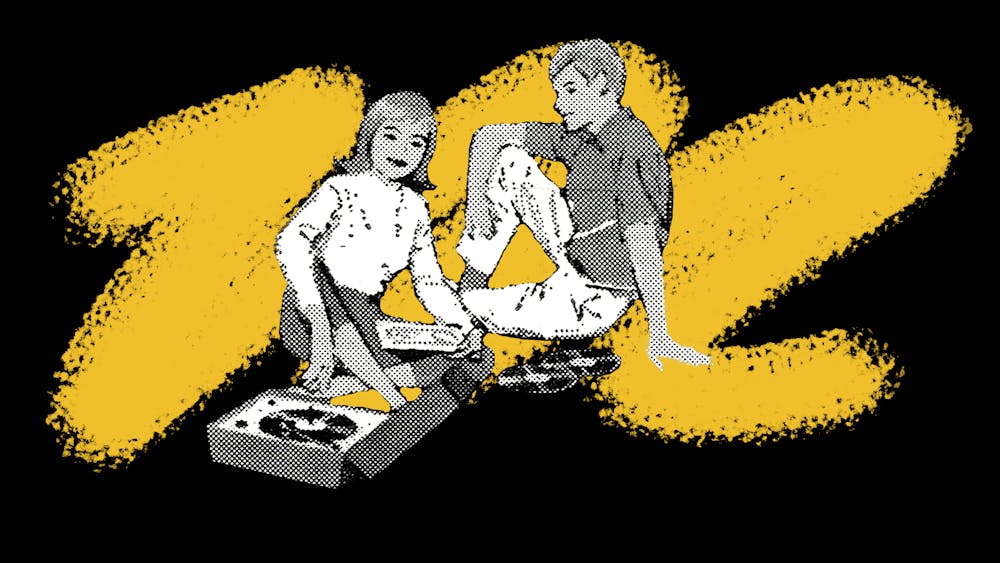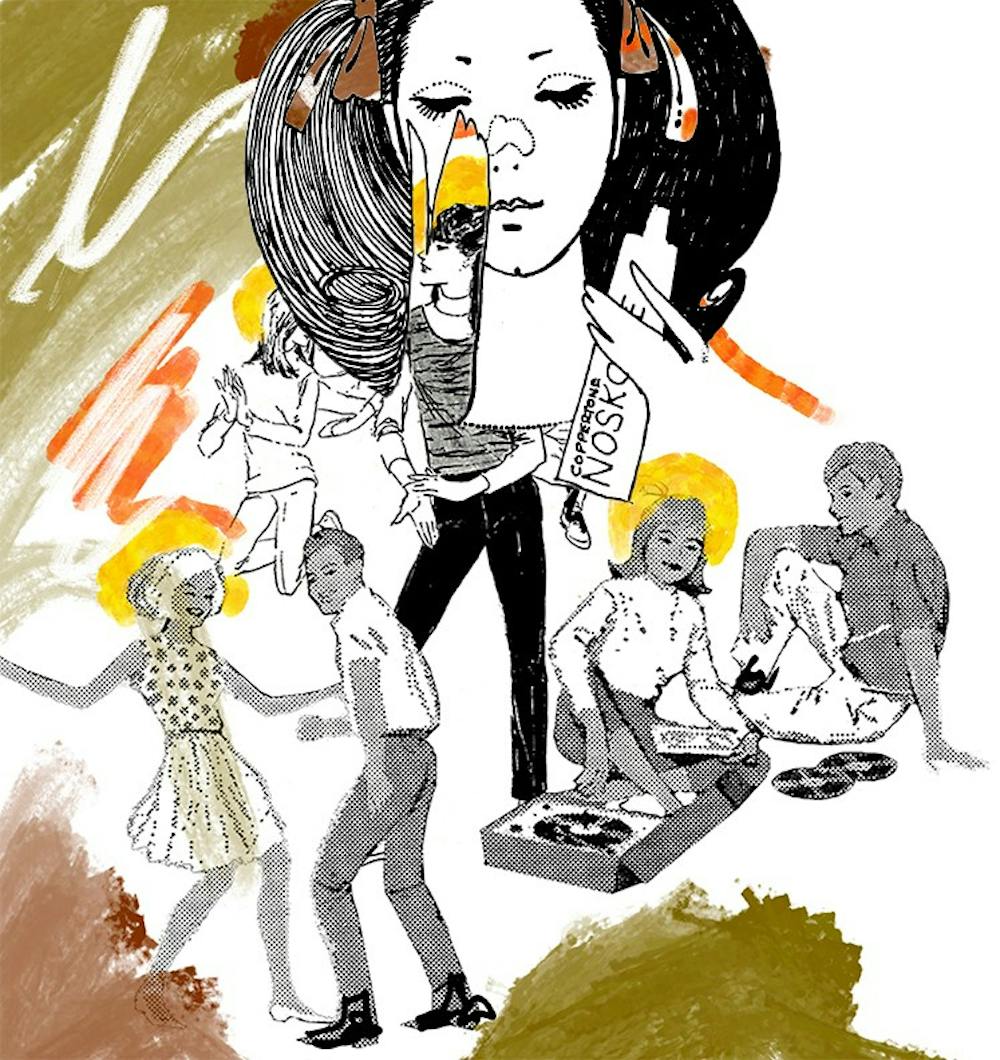Are you a creative, feminine-presenting performer residing in the Valley?
Are you craving the utter ecstasy of being talked over by men in their 20s?
Do you need someone in a watermelon-patterned button-up to explain what you did wrong in your performance?
Do you reminisce about the good old days, when caveman-esque sex jokes immortalized sixth-graders as gods? If your answer to any of these questions is yes, boy do I have a couple’a niches for you: film production and sketch comedy!
I’ve got one thing to say to any so-called comedians reading this — please stop joking about ejaculation. Nobody wants to imagine you hunched over naked, breathing like a gorilla in your bedroom. It’s really not funny. Have you ever seen four grown men get up on a stage one after another and each mimic fellatio on a microphone? I have.
You’d think after the first guy did it, the other three would be discouraged. But no.
For those who are sick of seeing microphones desecrated for the sake of mediocre-at-best comedy, improv may be more your style. If none of the performers can plan their jokes in advance, there’s no possible way they can all think to violate the microphone’s personal space.
Unfortunately, the advantages of zero preparation can’t fix the fact that the bar for young men in comedy is literally in hell. Have you ever tried to do an improv scene with a 20-year-old dudebro whose brain hasn’t fully developed? It’s a very specific kind of torture. And unfortunately, it’s a well-known feeling to any feminine comedians reading this.
In grade school, it seems like whenever teachers get the chance to, they create a group of monstrous idiots and plop one quiet girl into the center of it all to keep the boys “under control.” This all-too-common dynamic can be observed in nearly every room in every public school across America, from science labs to gymnasiums.
Girls are forced to wrangle rowdy teen boys to semi-successfully create a lemon battery in a 50-minute class period and bear the weight of a potentially poor grade thanks to their goldfish attention span.
It’s reminiscent of my least favorite novel: “Lord of the Flies.” I’ve always had one specific gripe with the supposedly legendary author of the book, William Golding. The allegedly poignant thesis of the novel — “an attempt to trace the defects of society to the defects of human nature,” per Golding’s own description — misses one very key point. Golding was talking about the nature of man. Put just one girl on the island. You could’ve avoided all the arson and murders and stuff, I guarantee it.
#Comedyisoverparty
If you thought Saturday Night Live produced some duds and flops, imagine what people who possess far less talent could do with the medium. I can’t blame them, really. There are really only four viable ways to end a scene in sketch comedy: Divorce, Gay, Loud and Child Abuse. Then, once enough straight men kiss each other, there’s really nothing left to do. Isn’t homosexuality such a funny punchline?
Folks, I’m sorry to break it to you, but there are other, funnier ways to end a sketch. Like at least six. But these require nuance — something no sketch comedy group ever manages to have.
To their credit, it’s not easy to perform comedy delicately. Besides, isn’t the point to ruffle some feathers?
If the rough-and-tumble comedy scene doesn’t appeal to you, you may find solace in its sister scene: film production. These sensitive boys aren’t anything like the brutes of comedy. They’re creative, thoughtful, and critical, and they’re all for female empowerment — whatever that may be.
They loved A24’s “Lady Bird,” especially the part when Timotheé Chalamet’s character tricked Lady Bird into having sex with him. And every “alternative” white man thought “Mid90s” was revolutionary. No way! Skate culture from 30 years ago! I’ve like, totally, never seen that before.
A24? More like A2ForgetYourInternalizedMisogyny. I mean, if I had zero media literacy, I sure would love watching these allegedly poignant feminist movies too. So many colors!
I’m sure we’d all like to think every script passes the Bechdel test nowadays. But in local productions, you’re lucky to get a role bigger than “Mom” or, god forbid, “Barista.”
It seems small, but little by little we teach people to write women into positions society approves of and avoid developing complex female characters. We’re using the misogyny ingrained into society to teach others. And when you’re building a house from ancient blueprints, of course it’s going to be a terrible house. If only Mom and Barista had a scene together.
I’m not saying that every film student across the globe is some monster, but I am saying each and every one has the capacity to be. We live in the digital age, where all of the worst people you know have a podcast. And thanks to ASU, soon they’ll also have a short film!
Look out NYU, here comes Michael Crow’s latest project: the Media and Immersive eXperience — or MIX — Center. In his most daring collaboration yet, ol’ Mike and the city of Mesa have built a 118,000 square foot film production studio. Just what the doctor ordered: a giant waste of money smack dab in the middle of the metro area.
I can’t think of a single other problem in Arizona anyway. When I look at our education system, politics and inflation rate I can only think one thing: we need a $93.5 million movie studio!
Personally, I’m thrilled. The more money ASU dumps into its film program, the more male feminists the school can spawn. Media literacy is already low in the U.S., so we’re treading in dangerous waters by even having a film school.
I’m not even saying it’s entirely the University’s fault. It’s simply hard to pride yourself on whom you include when so many of them are idiots.
I sincerely hope that ASU’s attempt to usurp California’s film-laden culture is a success, and I don’t want to mock what could be the makings of a good film school. I have a confession to make. I’m ... a freshman. I came from the very spawn point I’m criticizing just five months ago! I’m not going to pretend I’m the expert on all things ASU. But I do know what I’ve seen during my time in the Arizona comedy scene — and it’s not pretty.
It happens to all of us
I don’t mean to rake an entire gender through the coals. And if you’re angry, this probably reads like a cheap top-ten article for men’s worst moments in these fields. I’m not calling out every man, just the culture that every man before now created. There are plenty of supportive and kind people of any gender in the theatrical arts.
But, something to consider: misogyny plagues us all.
We may think misogyny is confined to frat bros and football players, but even “sensitive” boys have it pounded into their skulls from birth. It’s subtle. It shows in the way these guys buddy up, in how they don’t listen to others, in how they portray gender in their sets and in who they cast in their films.
I’m not even blaming each individual man. Not to sound like The Joker, but it’s society. I hope my masculine readers can absorb this and consider how they treat their feminine scene partners. Or maybe everyone in comedy has to be nonbinary. I think that would ultimately be best.
I really shouldn’t be the one to speak on this. I am the problem. The mirror image of my described watermelon button-up-wearing misogynists. And really I’ve painted the scarlet letter on my ironic Gildan T-shirt I plucked from Goodwill.
That’s right, the women of comedy deserve some hate too. I see you, lesbian mullet pixie dream girl.
I have a bone to pick with the idea of “female comedians.” From Chelsea Handler’s Netflix special “Hello, Privilege. It’s Me, Chelsea” to Amy Schumer’s encyclopedia of tired sex jokes, it seems the only women in comedy anybody remembers are the cringey ones.
Why is Amy Schumer the only female comedian men talk about? There are no working comedians who think she’s funny. She steals material from well-known comics, clearly prefers cash grabs over art, and lacks any restraint in her delivery. So, stop talking about her now. I have officially ended the discourse. Instead, we can talk about the extremely talented working comics Jenny Slate, Maria Bamford, Mitra Jouhari, Hannah Gadsby, Sarah Sherman, Catherine Cohen, Rachel Sennott, Ayo Edebiri, Meg Stalter — you get the point.
But why do we have to call such attention to gender anyway? Believe me, I’d like to live in a genderless world as much as any young queer — but we don’t ... yet.
Despite the comedic work of the women I’ve just mentioned — and the work of countless more — the image of a comedian or filmmaker in people’s minds is still male. We all picture a man in a suit on that stage. So, I think that when people see a female performer, they see a female performer.
Maybe they don’t necessarily see that as a negative, but they see it as a difference. They can’t help but watch the performance through misogyny-tinted glasses, making implicit assumptions about what womanhood is. Unknowingly, their expectations have changed.
So when male comics are bad, it’s because they’re just not funny. When female comics are bad, it’s because they’re women.
The worst part is, even I can’t help but see the performance that way. I’ve talked a lot about other people’s biases thus far, but the only reason I’m writing this is that I’ve spent so much time thinking about it. It’s really hard to unlearn a masculine existence. I’ve hated myself since birth, and men have hated me since birth too. It’s nobody’s fault in particular. So when I’m on stage, I’m not only performing but watching myself perform through the lens of my gender.
Some crumble under the pressure, playing into the shock value of a woman on stage by saying “unfeminine” things to a gawking crowd. Well, boy, she sure isn’t ladylike! She’s performing the opposite of womanhood and thus it is funny! I think, however, in a subtle way, that attitude is largely reductive. Women are funny. There’s no need to play into what men’s image of a woman is.
Edited by Sam Ellefson, Camila Pedrosa, Alexis Moulton and Greta Forslund.
This story is part of The Culture Issue, which was released on Feb. 8, 2022. See the entire publication here.
Reach the columnist at cageare@asu.edu and follow @notevilclaire on Twitter.
Editor's note: The opinions presented in this column are the author's and do not imply any endorsement from The State Press or its editors.
Want to join the conversation? Send an email to opiniondesk.statepress@gmail.com. Keep letters under 500 words and be sure to include your university affiliation. Anonymity will not be granted.
Like State Press Magazine on Facebook, follow @statepressmag on Twitter and Instagram and read our releases on Issuu.





